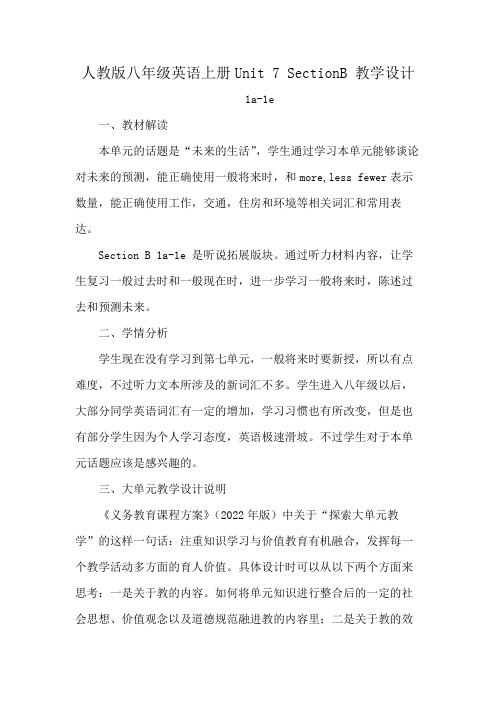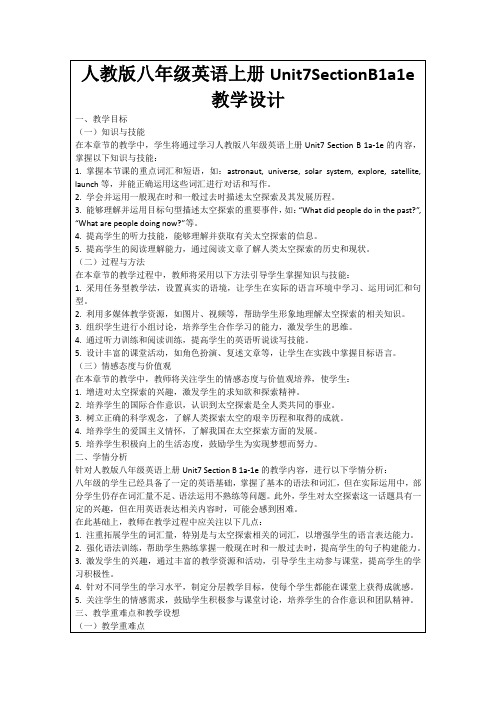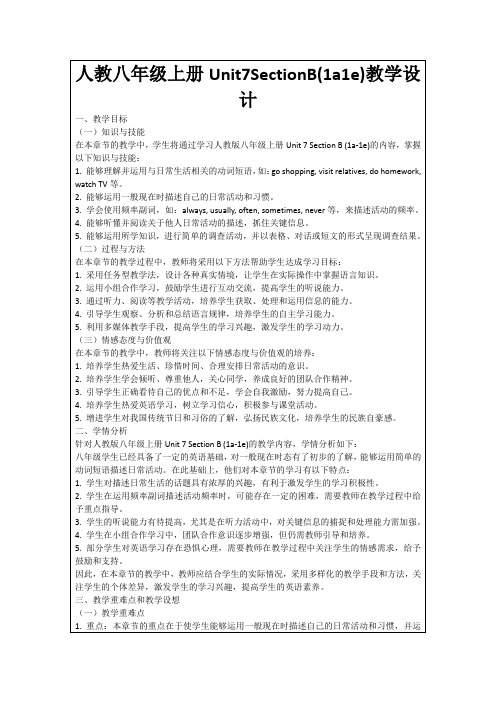2019人教版英语八年级上册教案:Unit7 SectionB(1a-1d)精品教育.doc
人教版英语八年级上册教案:Unit7 SectionB(1a-1d)-精选学习文档

Unit7 SectionB(1a-1d)教案【教材版本与册数】新目标人教版八年级上册【单元名称】Unit7 Will people have robots ?【课时】Section B 1a-1e (第3课时)【课型】Listening and Speaking(听说课)第 1 页第 2 页第 3 页当堂测试答案:一、1. won’t watch 2.felt, had a fever 3.will read 4.Can, get 5.did leave for 6.made 7.moves 8.am 9.will have 10.gets二、1-5:CDDDB 6-8:CDB当堂测试习题:1. Tom _______ (not watch)TV next Monday.2. He ______(feel) hot and________(have a fever) last night.第 4 页3.Lily _______ (read)this story book next week.4. ----_______ you______(get)me another copy of today’s newspaper?----OK.5.What time_______ you _______ (leave for) Shanghai yesterday?6.What _____________ (make) her laugh (哭) just now?7. The moon ______ (move) around the earth.8. I_______ (be) ill. I want to stay in bed.9.Lily________ (have) an exciting party next Sunday.13. He ______(get) up at half past six every day.二、单项选择( ) 1. There __________ a sports meeting this Sunday.A. will be going toB. will going to beC. is going to beD. will go to be( ) 2. Charlie ________ here next year.A. isn't workingB. doesn't workingC. isn't going to workingD. won't work( ) 3. Mom _____ very busy this week, she ____ free next week.A. will be; isB. is; isC. will be; will beD. is; will be ( ) 4. There _____ a elephant show in the zoo tomorrow evening.第 5 页A. wasB. is going to haveC. will haveD. is going to be( ) 5. She ________ me a special gift on my next birthday.A. will givesB. will giveC. givesD. give( ) 6. Mike ________ her a pretty hat on her next birthday.A. givesB. gaveC. will giveD. is going to giving( ) 7. - Where is the morning paper?- I ________ it for you at once.A. getB. am gettingC. to getD. will get( ) 8. ________ an NBA match next Saturday?A. There will beB. Will there beC. There can beD. There are第 6 页。
人教版英语八年级上册:Unit 7 Section B(1a-1e)教案

Unit 7 Will people have robots?Section B 1a-2e一、教学目标1. 能掌握以下单词:apartment, rocket, space station, even, human等2. 能掌握以下句型:—Where do you live? —I live in an apartment.3. 能听懂有关未来生活的对话内容,并能表述自己对未来生活的预测。
4. 能运用所学的知识及提示来阅读相关个人未来生活预测,并能完成相关任务。
5. 通过引导学生展望未来,及对未来生活的设计,来达到前景教育的目的,同时也通过对前景的设想,树立学生远大理想,为学生树立正确的价值观。
二、教学重点及难点重点:1. 掌握本课时重点词汇和句型表达。
2. 能听懂有关未来生活的对话内容。
3. 能阅读有关个人未来生活预测的语篇材料。
难点:1. 能表述自己对未来生活的预测。
2. 能运用所学的知识及提示来阅读相关个人未来生活预测,并能完成相关任务。
三、教学准备教师:教学课件;多媒体设备学生:课前预习四、教学过程Task 1Step 1 Warming-upLook at the picture and talk about the life in the future.【设计意图】看图讨论有关未来生活的话题,能激起学生学习兴趣,使学生更快进入新课的学习中。
Step 2 Pre-listeningWork on 1aT explains the words given in 1a to the Ss. Then Give some examples of the words. Finally ask Ssto write each word in the correct column below.Work on 1bSs work with your partners. Think of other words and write them in the chart in 1a. Let Ss discuss the words and write them in the chart. Then let some Ss read the words.【设计意图】学习新的单词,在学习过程中,要注意单词拼写的正确性以及单词的读音的正确性。
人教版八年级英语上册Unit 7 SectionB 教学设计

人教版八年级英语上册Unit 7 SectionB 教学设计1a-1e一、教材解读本单元的话题是“未来的生活”,学生通过学习本单元能够谈论对未来的预测,能正确使用一般将来时,和more,less fewer表示数量,能正确使用工作,交通,住房和环境等相关词汇和常用表达。
Section B 1a-1e 是听说拓展版块。
通过听力材料内容,让学生复习一般过去时和一般现在时,进一步学习一般将来时,陈述过去和预测未来。
二、学情分析学生现在没有学习到第七单元,一般将来时要新授,所以有点难度,不过听力文本所涉及的新词汇不多。
学生进入八年级以后,大部分同学英语词汇有一定的增加,学习习惯也有所改变,但是也有部分学生因为个人学习态度,英语极速滑坡。
不过学生对于本单元话题应该是感兴趣的。
三、大单元教学设计说明《义务教育课程方案》(2022年版)中关于“探索大单元教学”的这样一句话:注重知识学习与价值教育有机融合,发挥每一个教学活动多方面的育人价值。
具体设计时可以从以下两个方面来思考:一是关于教的内容。
如何将单元知识进行整合后的一定的社会思想、价值观念以及道德规范融进教的内容里;二是关于教的效果。
要根据本单元的大主题、大目标,明确通过这一单元的学习最终要让学生形成怎样的价值观念和价值态度及怎样的正确价值原则的生活方式。
《英语课标(2022版)》要求教师认真分析单元教学内容,梳理并概括与主题相关的语言知识、文化知识、语言技能和学习策略,并根据学生实际水平和学习需求筹教学安排。
在此过程中,英语教学应重视科学地设计教学过程,努力创设所需情境,以营造启动学生思维的教学环境,帮助学生获取知识,加速内化,灵活运用,变语言为工具,拓展视野,并有机渗透情感、态度和价值观。
总的来说,英语的大单元教学需要着眼于“大”字,从大处着眼,大处着手,总分总结构,具体表现在视野大、内容大、主题大,情境大和目标大等等。
四、教学目标Teaching aims(教学目标)At the end of this class, students are able to :1.get specific Information about Joe's life indifferent periods through listening.2.describe and compare one's life in different periods.3. describe the changes of our hometown and motherland.4.predict the trend of future life, feel the hope to the future and expect the future.五、教学重难点How to use the future tense to describe the life in the past ,now and in the future.六、教学过程Step 1 : Warm-up and danceHave Ss warm up by waving the Five-starred Red Flag and dancing to the music , watching the video" The Changes Of China in The Past 10 Years",which BGM is "My People, My Country".Step 2 : Think and Lead-inHave Ss to think about the video and then move to the big task.T:After watching this video,we know that many changes have taken place. Many people want to know more.T:The Tiktok is holding a short video competition, which topiac is "Yesterdat, today and tomorrow."T:Let's prepare for our short videos.Step 3: Learn new word and expressions through Liangliang's storyBy recalling Liangliang's story to teach the words about transportations, living places and jobs:Teach the newwords by presenting pictures: astronaut, apartment, rocket, space, space stationActivity 1: look and say ——in transportationActivity 2: look and learn——in transportationActivity 3: look and learn——in living placesActivity 4: look and predict——in jobsStep 4: Think and classifyActivity 5 : think and classify(1a)Have two students play the game to classify the words of transportation, living places and jobs;Other students finish 1a on students' textbooks.Step 5 : Listen and number --Work on 1c.Activity 6: Listen to Alexis and Joe. Number the pictures [1-3].Have Ss listen to the conversation between Alexis and Joe. Then, number the pictures 1–3.Check Ss’ answers.Then have Ss think of other words and write them on the task sheet too.Step 6 : Listen and fill --Work on 1d.Activity 7: Fill in the blanks with the correct verbs in the box.Ss are to listen again to the conversation. This time, they are to work on 1d and fill in the blanks with the correct verbs from the box.Tell Ss that they can check their answers by using the ipad.Step 7 : Pair work.Activity 8 : Listen and write first, then Role-playHave Ss get into pairs. Student A is Robot Reporter and Student B is Liangliang or yourself.T: In your pairs, talk about Liangliang’s or your own life now, 10 years ago and 10 years from now.(Try to imitate the tone of the robot reporter)Step 8 : Group workThink and creat:Firstly, present the video about the changes of Teacher's hometown(Shiba Dong)Secondly, present the result of the survey ofXingsha(done by the students)Thirdly, present the video about the real changes of Xingsha(students' hometown)work in groups to make and rehearse(排练) your short videos: a rap or a street interview (choose one of them)Topic: Yesterday, today and tomorrow about Xingsha,Liangliang or yourself.Step 9:HomeworkA level: Better your short videos.B level: Tell Write the script of your short videos.。
Unit7SectionB(1a-1e)教案人教版英语八年级上册

Unit7 SectionB(1a1e)教学目标1.掌握关于职业、交通的单词、短语、句型2.巩固一般过去时态、一般现在时态和一般将来时态的用法区别3. 继续学习will表将来的用法并能熟练运用will句式对未来进行预测。
教学难点1.我能灵活运用fewer, less和more的区别完成3a2.我会用一般将来时对未来进行预测。
教学过程一、Lead inWhat do you want to be in the future?I will be a pilot.Where will you live?I will live in a high building.I will go to work by bike.I will be an astronaut. I will live in other planets. I will go to work by spaceship.Ask and answerNew wordse.g. An astronaut takes the rockets to the space station.宇航员乘火箭去空间站。
1aWrite each word in the correct column below.astronaut house apartment trainrocket space station puter programmerGrouplearning Task 2 (3mins)Discussion1. Where are the two people in each picture?2. What are they doing in each picture?3. What do you think they are saying to each other?1b Think of other words and write them in the chart in 1a.TalkingAn astronaut lives in a space station. He goes to work by rocket.A programmer lives in an apartment. He goes to work by subway.A farmer lives in a house.He walks to the farm.An engineer lives in an apartment. He goes to work by car.1cListen to Alexis and Joe. Number the pictures [13].1dListen again. Fill in the blanks with the correct verbs in the box.am live worklived tookwill be will live will fly1. I ________ in an apartment across the street from here.2. I ________ near here.3. I ________ a puter programmer.4. We ________ in a house in the country.5. I ________ the train to school.6. I ________ an astronaut.7. I ________ rockets to the moon.8. I ________ on a space station.Conversation 1Alexis: Hi, I’m Alexis.Joe: Nice to meet you, Alexis. I’m Joe.Alexis: Nice to meet you, Joe. Do you live here in Highville?Joe: Yes, I do. I live in an apartment across the street from here. Alexis: Oh, really?Joe: Yes. I work near here too. I ’m a puter programmer.Alexis: A puter programmer? That sounds interesting.Joe: Well, actually (事实上) it’s kind of boring. I do the same thing every day.Conversation 2Alexis: Hey, Joe ,is that a picture of you?Joe: Yeah, that was me 10 years ago.Alexis: So, did you live here in Highville 10 years ago?Joe: No, I lived with my parents in Greenville. We lived in a house in the country. I went to school here in Highville, though.Alexis: Really? That’s pretty far from here. How did you get to school?Joe: Oh, I took the train to school.Conversation 3Alexis: So, Joe, what do you think your life will be like in ten years?Joe: Oh, I think I’ll be an astronaut.Alexis: An astronaut? Are you kidding?Joe: No, I’m serious. I’ll fly rockets to the moon. Maybe I’ll fly to other planets .Alexis: Oh, and where will you live?Joe: I’ll live on a space station.课堂练习同学们做exercisesthank you。
人教版八年级英语上册Unit7SectionB1a1e教学设计

(一)导入新课,500字
在课堂开始阶段,我将采用以下方法导入新课:
1.激发兴趣:向学生提问:“Do you know about space exploration? Have you ever imagined what it would be like to travel in space?”通过问题引导学生展开想象,激发他们对太空探索的兴趣。
2.家长要关注孩子的学习进度,协助孩子完成作业,并给予适当的指导。
3.学生在完成作业后,要进行自我检查,确保作业质量。
4.教师在批改作业时,要关注学生的错误,及时给予反馈效率。
难点:如何帮助学生克服在听力过程中遇到的生词、语速等困难,提高学生的听力水平。
(二)教学设想
1.创设情境,激发兴趣:通过展示太空探索的图片、视频等资源,创设真实、有趣的情境,激发学生的学习兴趣。
2.分层教学,关注个体差异:针对学生的不同水平,设计难易程度不同的教学活动,使每个学生都能在课堂上得到锻炼和提升。
2.强化语法训练,帮助学生熟练掌握一般现在时和一般过去时,提高学生的句子构建能力。
3.激发学生的兴趣,通过丰富的教学资源和活动,引导学生主动参与课堂,提高学生的学习积极性。
4.针对不同学生的学习水平,制定分层教学目标,使每个学生都能在课堂上获得成就感。
5.关注学生的情感需求,鼓励学生积极参与课堂讨论,培养学生的合作意识和团队精神。
1.回顾重点:对本节课所学的词汇、短语、句型和语法进行回顾,巩固重点知识。
2.答疑解惑:针对学生在课堂中遇到的问题,进行解答,帮助学生消除疑惑。
3.课堂小结:总结本节课的学习内容,强调学习方法和技巧,提高学生的学习效果。
4.课后作业:布置适量的课后作业,要求学生在课后巩固所学知识,为下一节课的学习做好准备。
人教八年级上册Unit7SectionB(1a1e)教学设计

为了巩固本节课所学的一般现在时和频率副词的用法,以及日常活动的描述,我设计了以下作业:
1.家庭作业:请学生根据本节课的内容,编写一段关于自己或家庭成员日常生活的对话,要求使用一般现在时和频率副词。对话内容需包含至少5个不同的日常活动,并在下节课前提交。
目标:通过实际编写对话,使学生能够更熟练地运用目标语言,提高他们的写作能力。
2.口语作业:学生与家长合作,进行一次角色扮演活动。学生扮演老师,向家长介绍一般现在时和频率副词的用法,并教授家长如何描述日常活动。完成后,家长需在学生的作业记录本上签名,以示完成。
目标:通过亲子互动,激发学生的学习兴趣,提高他们的口语表达能力,并增进家校合作。
3.小组作业:将学生分为小组,每组设计一份关于日常活动调查问卷。问卷中至少包含5个问题,涉及同学们的日常活动及频率。小组成员相互采访,完成问卷,并将调查结果整理成报告。
5.利用多媒体教学手段,提高学生的学习兴趣,激发学生的学习动力。
(三)情感态度与价值观
在本章节的教学中,教师将关注以下情感态度与价值观的培养:
1.培养学生热爱生活、珍惜时间、合理安排日常活动的意识。
2.培养学生学会倾听、尊重他人,关心同学,养成良好的团队合作精神。
3.引导学生正确看待自己的优点和不足,学会自我激励,努力学会使用频率副词,如:always, usually, often, sometimes, never等,来描述活动的频率。
4.能够听懂并阅读关于他人日常活动的描述,抓住关键信息。
5.能够运用所学知识,进行简单的调查活动,并以表格、对话或短文的形式呈现调查结果。
3.引导学生关注动词在一般现在时中的变化,通过头脑风暴的方式,让学生们列举出已经学过的动词第三人称单数形式。
人教版英语八年级英语上册Unit7SectionB(1a~1e)教学设计

1.教师设计丰富的课堂练习,包括听力、阅读、写作和口语等方面,以巩固所学知识。
2.听力练习:教师播放一段与太空探索相关的听力材料,学生完成相应的练习题。
3.阅读练习:学生阅读课文,完成信息匹配、归纳总结等任务,提高阅读理解能力。
4.写作练习:学生根据所给话题,用一般现在时和一般过去时撰写一篇短文,如:“My dream of becoming an astronaut.”
4.通过听力训练,引导学生掌握听力策略,如预测、关键词定位等,提高听力理解能力。
5.鼓励学生进行课外阅读,拓展知识面,提高学生的跨文化交际能力。
(三)情感态度与价值观
1.培养学生对太空探索的兴趣,激发学生的科学精神。
2.引导学生了解我国在太空领域的成就,培养学生的民族自豪感。
3.通过学习太空探索的相关知识,培养学生热爱自然、保护地球的意识。
3.阅读作业:阅读一篇关于太空探索的文章,完成文章后的练习题,并总结文章的主要观点。
4.听力作业:观看一段太空探索相关的英语视频,回答相关问题,提高听力理解能力。
5.写作作业:以“我的太空梦”为主题,运用本节课所学的词汇、短语和时态,撰写一篇英语短文,字数在100-120词左右。
6.小组作业:分组进行太空探索项目研究,选择一个太空探索领域的话题,如:火星探测、月球基地等,搜集资料、整理数据,并以PPT形式展示研究成果。
(1)过程性评价:关注学生在课堂活动中的表现,鼓励学生积极参与,勇于表达。
(2)终结性评价:通过单元测试、期中考试等,检验学生对知识点的掌握情况。
(3)自评与互评:培养学生自我反思、自我评价的能力,以及学会欣赏他人、互相学习的品质。
四、教学内容与过程
(一)导入新课(500字)
人教新目标八年级英语上册第7单元教案(教学设计)

单元 课时 安排
Period 1 Period 2 Period 3 Period 4 Period 5-6 Period 7 Period 8
section A 1a—1c section A 2a-2d section A Grammer Focus-3c section B 1a-1e section B 2a-2e section B 3a-3c section B 4-self check
Teaching Notes
Reflection after teaching
签批
2
Unit 7
Period2
Section A (2a-2d ) 总课时 48
Teaching Aims
Teaching Key Points Teaching Difficult Points Teaching Methods
做预言,用 will 来讨论未来发生的事情
Teaching Methods Audio-lingual method; Communicative Approach; PPT
Teaching Procedures
Step 1 情景导入 (Show a picture of a robot) Teacher:What's this? Students:It's a robot. Step 2 完成教材 1a—1c 的任务 1.在今后的 100 年里世界将会有怎样的不同呢?阅读 1a 中的预言,同意请在 A 处打勾,不同意请在 D 处打勾,完成后小组内互相交流。(3 分钟) 2.熟读 1a 中的句子,并两人一组互相背诵句子。(5 分钟) 3.以小组为单位,结合图片和 1a 中的句子,小组讨论一般将来时态的各种句型 的构成,教师点拨。(5 分钟) 1.will 表示将来时的用法 1)他们将有个愉快的寒假。 They_will_have_a_pleasant_winter_holiday. 2)他们将不会有一个愉快的寒假。 They_won't_have_a_pleasant_winter_holiday. 3)他们将有个愉快的寒假吗?是的,会有。/不,不会的。 Will_they_have_a_pleasant_winter_holiday ? Yes , they_will./No , they_won't. 一般将来时态表达将来某一时间要发生或将要发生的动作或状态。其陈述句构成 为:主语+will+动词原形(当主语为第一人称时,一般用 shall 代替 will;当主语 为其他人称时,用 will,但主语为第一人称时,也可以用 will)。 否定句:主语+will+not+动词原形. 一般疑问句:Will+主语+动词原形? 肯定回答:Yes,主+will. 否定回答:No,主+will+not(可以缩写成 won't). 2.in+一段时间的用法 1)他三个小时以后回来。 He'll_come_back_in_three_hours. “ in + 一 段 时 间 ” 表 示时 间 段 之 后 , 常 用 于 将来 时 态 中 。 对 此 短 语 提问 用 How_soon。
- 1、下载文档前请自行甄别文档内容的完整性,平台不提供额外的编辑、内容补充、找答案等附加服务。
- 2、"仅部分预览"的文档,不可在线预览部分如存在完整性等问题,可反馈申请退款(可完整预览的文档不适用该条件!)。
- 3、如文档侵犯您的权益,请联系客服反馈,我们会尽快为您处理(人工客服工作时间:9:00-18:30)。
Unit7 SectionB(1a-1d)教案【教材版本与册数】新目标人教版八年级上册
【单元名称】Unit7 Will people have robots ?
【课时】Section B 1a-1e (第3课时)
【课型】Listening and Speaking(听说课)
第 1 页
第 2 页
第 3 页
当堂测试答案:
一、1. won’t watch 2.felt, had a fever 3.will read 4.Can, get 5.did leave for 6.made 7.moves 8.am 9.will have 10.gets
二、1-5:CDDDB 6-8:CDB
当堂测试习题:
1. Tom _______ (not watch)TV next Monday.
2. He ______(feel) hot and________(have a fever) last night.
第 4 页
3.Lily _______ (read)this story book next week.
4. ----_______ you______(get)me another copy of today’s newspaper?
----OK.
5.What time_______ you _______ (leave for) Shanghai yesterday?
6.What _____________ (make) her laugh (哭) just now?
7. The moon ______ (move) around the earth.
8. I_______ (be) ill. I want to stay in bed.
9.Lily________ (have) an exciting party next Sunday.
13. He ______(get) up at half past six every day.
二、单项选择
( ) 1. There __________ a sports meeting this Sunday.
A. will be going to
B. will going to be
C. is going to be
D. will go to be
( ) 2. Charlie ________ here next year.
A. isn't working
B. doesn't working
C. isn't going to working
D. won't work
( ) 3. Mom _____ very busy this week, she ____ free next week.
A. will be; is
B. is; is
C. will be; will be
D. is; will be ( ) 4. There _____ a elephant show in the zoo tomorrow evening.
第 5 页
A. was
B. is going to have
C. will have
D. is going to be
( ) 5. She ________ me a special gift on my next birthday.
A. will gives
B. will give
C. gives
D. give
( ) 6. Mike ________ her a pretty hat on her next birthday.
A. gives
B. gave
C. will give
D. is going to giving
( ) 7. - Where is the morning paper?
- I ________ it for you at once.
A. get
B. am getting
C. to get
D. will get
( ) 8. ________ an NBA match next Saturday?
A. There will be
B. Will there be
C. There can be
D. There are
第 6 页。
